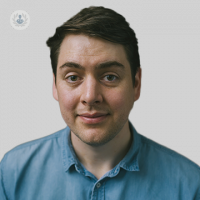Understanding transcranial direct current stimulation (tDCS): How does it treat depression?
Written by:In his latest online article, renowned consultant psychologist Dr Justin Stephenson explains the benefits of transcranial direct current stimulation (tDCS) as a treatment for depression. Dr Stephenson explains how this treatment works, the research behind it and the possible side effects.

Transcranial Direct Current Stimulation (tDCS) stands as a non-invasive technique utilizing low-level electrical currents to target specific regions of the brain. This procedure entails the placement of two electrodes on the scalp, through which a constant, mild electrical current is directed into the brain. Remarkably, this procedure is devoid of pain and anaesthesia requirements.
How does tCDS help with depression?
A noteworthy application of tDCS is its efficacy in treating depression. The electrical currents administered via the electrodes are believed to influence the activity of specific brain cells and foster an elevation in the production of neurotransmitters that play a pivotal role in regulating mood.
What does the research on this treatment show?
Multiple studies have been undertaken to ascertain the effectiveness of tDCS in mitigating depression. A comprehensive analysis of individual patient data discovered that tDCS exhibited effectiveness in alleviating symptoms of depression during acute major depressive episodes. Another controlled trial, employing randomised sham procedures, corroborated the positive impact of tDCS in diminishing depression symptoms over a three-week duration.
Furthermore, a double-blind, placebo-controlled study revealed the efficacy of tDCS in treating depression among patients who had previously shown unresponsiveness to alternate treatments. A randomised controlled trial comparing tDCS with the antidepressant Venlafaxine highlighted their comparable effectiveness in significantly reducing depression severity.
Are there any side effects?
Clinical trials employing conventional tDCS protocols on human subjects, comprising over 33,200 sessions involving 1,000 participants with repeated sessions, have reported no instances of serious adverse effects. Generally, tDCS is regarded as safe and well-tolerated. Instances of mild side effects, like temporary skin irritation or tingling sensations on the scalp, may manifest. It is noteworthy that these side effects typically subside shortly after the conclusion of treatment. In rare circumstances, tDCS might lead to headaches, dizziness, or nausea.
Who is elegible for tDCS?
Individuals grappling with depression who have shown an inadequate response to existing treatments or are seeking an alternative to medication may find tDCS to be a suitable treatment avenue.
Dr Justin Stephenson is a renowned consultant psychologist with over two decades of experience. If you would like to book a consultation with Dr Stephenson, you may do so today via his Top Doctors profile.


